Highlights
- This month, we worked with our partners at the Society of Family Planning (SFP) to launch the second iteration of SFP Wiki Scholars courses. SFP is sponsoring additional courses to train their members—primarily medical practitioners—how to add scientific information to family planning articles.
- This month the English Wikipedia celebrated a major milestone: 6 million articles! As the number climbed closer to that figure, many members of the editing community worked feverishly to create articles in the hope that theirs would be number 6,000,000. The article’s creator was none other than Northeastern University Visiting Scholar Rosie Stephenson-Goodknight, who told the Wikipedia community newsletter, The Signpost that she “woke up at 3:30 AM the morning of January 23rd. Unable to go back to sleep, I went into the living room. I opened up my laptop to Wikipedia and noticed we were a few hundred articles shy of the 6 millionth article. I decided to create an article about a woman writer, my preferred focus, on the chance that when I would be ready to click Save, it would miraculously be the right moment.”
- The board met in San Francisco for an in-person meeting. The board approved the creation of an Advisory Board, the extension of our current strategic plan, and two new board members: Jon Cawthorne, Dean of the Wayne State University Library System and incoming president of the Association of College & Research Libraries (ACRL), and Meaghan Duff, Owner & Principal of Mercy Education Partners and former Senior Vice President for Partnerships & Strategy at Faculty Guild.
Programs
Wikipedia Student Program
Status of the Wikipedia Student Program for Spring 2020 in numbers, as of January 31:
- 279 Wiki Education-supported courses were in progress (193, or 69%, were led by returning instructors).
- 4,381 student editors were enrolled.
- 67% of students were up-to-date with their assigned training modules
- Students edited 869 articles, created 18 new entries, and added 165,000 words and 2,030 references.
January marked the beginning of the Spring 2020 term, and as always, that means that students were busy signing up for Wikipedia usernames, getting familiar with the Dashboard, and generally introducing themselves to the ins and outs of Wikipedia editing.
Wikipedia Student Program Manager Helaine Blumenthal was busy approving course pages and making sure that all of our Spring 2020 courses are set up for success. She also launched a new feature of the Student Program where instructors receive an end of term email summarizing the work their students did along with links to easily share their successes on social media. Wikipedia Experts Ian Ramjohn, Elysia Webb, and Shalor Toncray were busy wrapping up courses from Fall 2019 and helping students as they plunged into their Wikipedia assignments.
Student work highlights:
Three student-authored articles appeared on Wikipedia’s Main Page in the Did You Know? section: Affect labeling on January 5, School belonging on January 6, Cognitive inertia on January 9, and Jellyfish bloom on January 13. Cognitive inertia was viewed over 6,700 while it was on Wikipedia’s main page, while jellyfish bloom received over 3,300 views.
Drosophila subobscura was promoted to Good Article status on January 18. Good Articles represent a tremendous effort from an editor, and it’s especially impressive that the student from Joan Strassman’s Behavioural Ecology course kept editing after their term ended to see the article through the peer review process.
Art is an enduring part of human life, as people have been drawn to create depictions of how they see and interpret their lives and the world around them. Students in Alice Price’s The Modern North class at Temple University, Tyler School of Art chose to create articles on topics and persons such as Isaac Levitan, a classical Russian landscape painter who advanced the genre of the “mood landscape”. During his life Levitan faced several challenges, one of which occurred toward the beginning of his art career when he along with many other Jewish people were forcibly deported from the big cities of the Russian Empire after Alexander Soloviev’s assassination attempt on Alexander II. Levitan was later allowed back into the city after several of his fans pleaded his case with the authorities. He was friends with famed writer Anton Chekhov, however the two had a falling out in 1892 over Chekov’s “The Grasshopper”, which Levitan believed was based on his romantic relationship with Sofia Kuvshinnikova. Although Chekhov apologized the two remained estranged until January 1895. Two years later Levitan was elected to the Imperial Academy of Arts and only a few short years after that Isaac Levitan died at the age of 39 at Chekhov’s home in Crimea. Although he suffered from heart complications throughout his life and his last works were increasingly filled with light. During the year after his death an exhibit of several hundred Levitan paintings was shown in Moscow and then in St. Petersburg.
Wikipedia is one of the world’s most accessed resources for people who want to learn more about health content, so we’re thrilled to support courses like this one out of University of Central Florida. When these health professions students learned how to edit Wikipedia, they applied their skills and knowledge towards high-impact articles like Anticoagulant, which is viewed nearly 1,000 times every day. Student editors greatly strengthened the section “Adverse effects”, which is critical information for consumers of health information. Altogether, the students rewrote over half of this page. Another topic of high importance edited by the students is Nephritic syndrome, which is a kidney disease. Before the student began editing, this page only had 10 references. Now, not only is the content much more robust, it is more verifiable, with a total of 46 references to high-quality sources.
Scholars & Scientists Program
Wikipedia
This was a busy month for the Scholars & Scientists program, wrapping up one course and starting three more!
First, we wrapped up Living Knowledge, our Wiki Scientists course focused on biology. Among the articles participants improved are:
- Reporter gene, genes used in research which help scientists identify and measure other genes. The article had been tagged as needing more references since 2008! At the start of the course, it had only 5 sources. A Wiki Scientist not only added information to the article but significantly improved the sourcing, increasing that number to 23.
- Stretch reflex, a muscle contraction in response to stretching in the muscle. A Wiki Scientist improved sourcing while adding quite a bit of information to the lead and several sections.
Early in the month we launched our exciting Science and Society course to improve currently relevant science topics. At the end of the month, we are only a few weeks into the process, with the group of 14 scientists working in sandboxes while learning to share their passion and knowledge on Wikipedia, but we see several fascinating articles to look forward to.
Toward the end of the month we also launched a course, #Envision2030, in partnership with Keene State College. Through it we will be teaching faculty and staff from Keene as well as nearby Plymouth State University to improve Wikipedia articles related to the UN’s Sustainable Development Goals.
Finally, we had our first meeting of a new kind of Wiki Scientists program. Last year we ran two successful courses with the Society of Family Planning, training its members to improve Wikipedia articles related to family planning, like abortion and contraception. Based on positive outcomes from those courses, SFP will be running two more courses this year. Additionally, we will be supporting members who have gone through the program in an alumni program. Through this initiative, we use a dedicated Slack channel, monthly standing meetings, and a monthly newsletter to foster ongoing engagement between Wiki Scientists and Wikipedia. Additionally, we are setting up a form to allow other SFP members to participate in the initiative by submitting opportunities for improvement that they see while reading Wikipedia. We know that scientists can do excellent work through out training programs, and we are excited to start this ongoing support model to facilitate contributions after the courses, too.
Outside of regular courses, Scholars & Scientists Program Manager Ryan McGrady attended the American Historical Association conference in New York to present on a panel, “Wiki Scholars: Historians and the National Archives Team Up for a Course to Improve Wikipedia’s Articles about Women’s Suffrage”. Ryan joined three of our past Wiki Scholars, Lindsey Wieck, Cassandra Berman, and Erin Siodmak, to talk about our long-term collaboration with the National Archives to improve articles relevant to women’s suffrage.
Wikidata
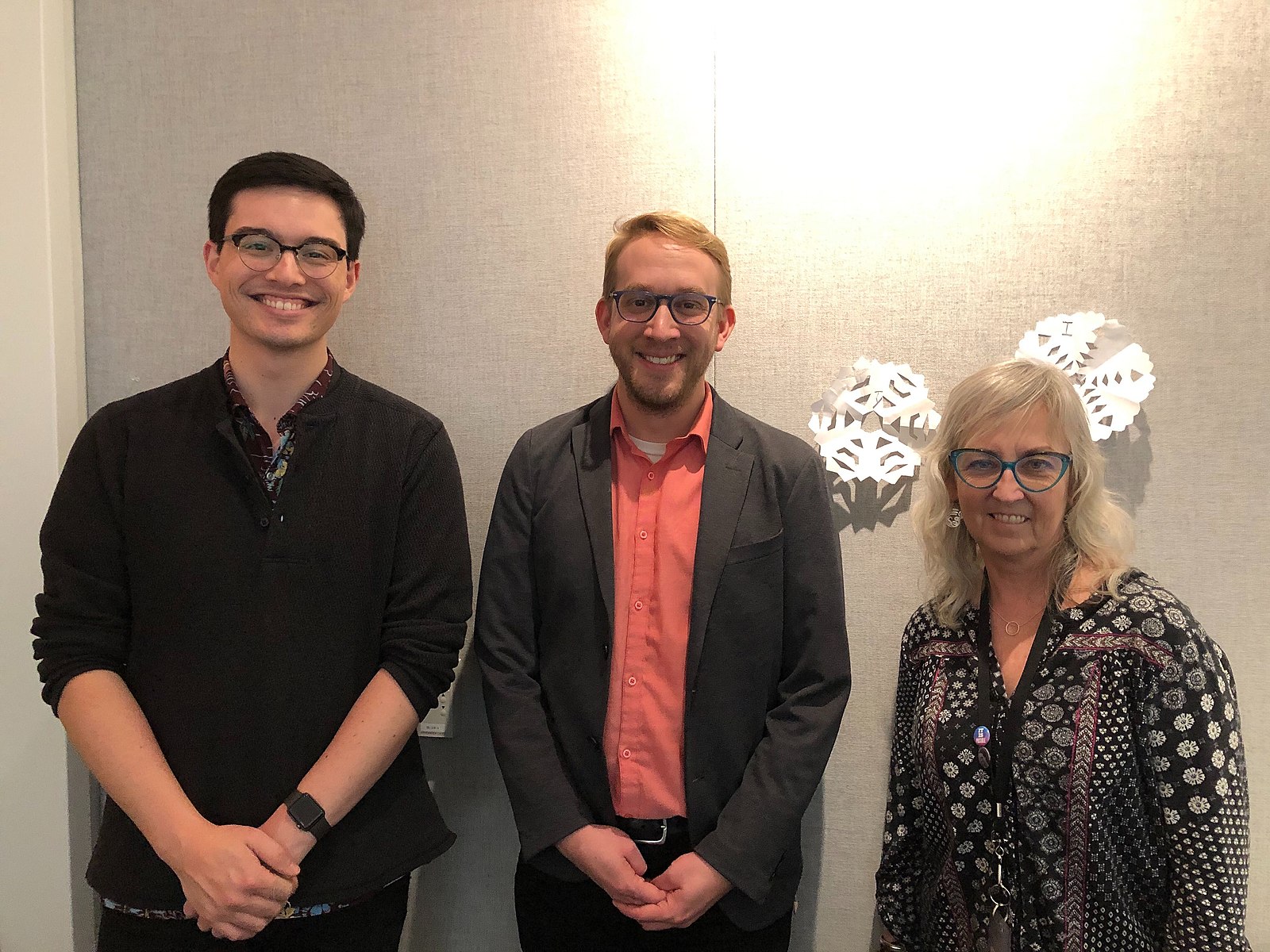
with Wikidata Program Manager, Will Kent (C)
This past month we began collecting best practices to create a self-directed Wikidata course. This process involves looking at other online course-delivery platforms, analyzing our current Wikidata training modules, and weighing what kind of features we would like this learning experience to have. We are excited to have multiple ways to deliver online learning opportunities about Wikidata and the various skills people may need to get the most out of Wikidata. We hope to release this new delivery method later this year.
Program manager Will Kent was also able to visit the San Francisco Museum of Modern Art (SFMOMA) to check in with some past Wikidata course participants Marla Misunas and Ian Gill. They discussed what was useful about the course and what SFMOMA has been working on since the course ended. Ian has been busy adding exhibition data about SFMOMA exhibitions to Wikidata. He created this query to track all exhibition data from 1935-2020. Feel free to follow the link and click the blue “play button” to see the full list of over 3,000 SFMOMA exhibitions.
This kind of query shows the impact that Wikidata can have not only at an institutional level, but also at a global level. Now that this dataset is open and freely accessible on Wikidata, other museums and individuals can see this data and use it in their own projects.
Visiting Scholars Program
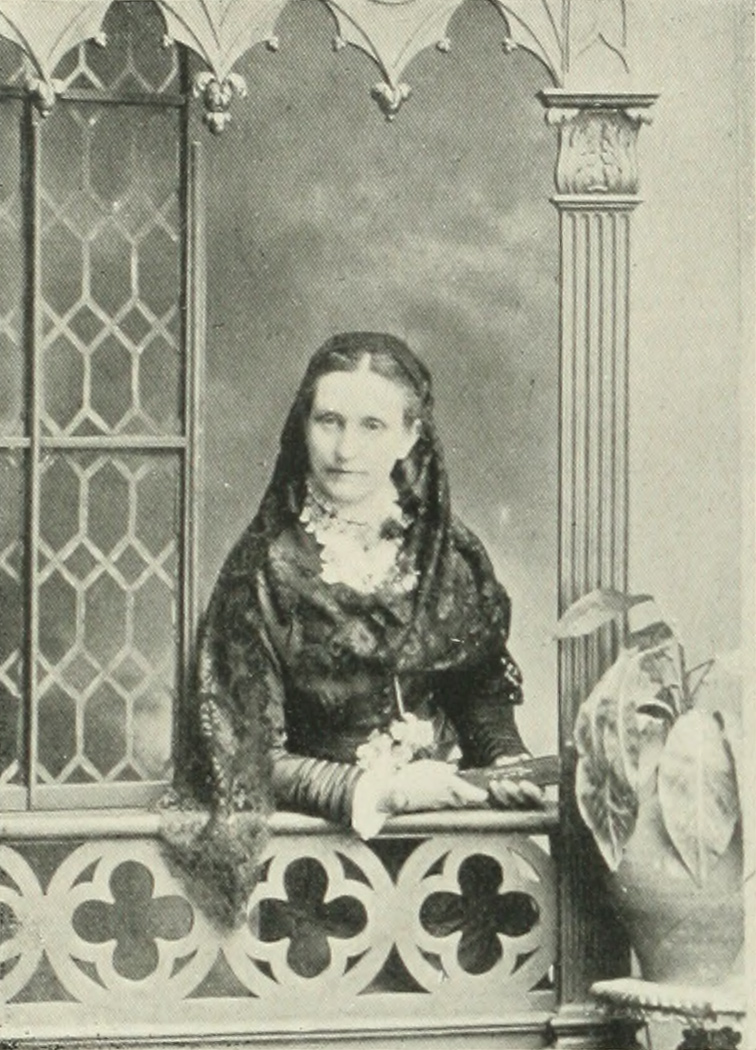
This month the English Wikipedia celebrated a major milestone: 6 million articles! As the number climbed closer to that figure, many members of the editing community worked feverishly to create articles in the hope that theirs would be number 6,000,000. Due to technical limitations, determining which article it was took both art and science, but ultimately settled on a biography for Maria Elise Turner Lauder (1833-1922). Lauder was a Canadian teacher, linguist, author, and philanthropist best known for her works about her travels. The article’s creator was none other than Northeastern University Visiting Scholar Rosie Stephenson-Goodknight, who told the Wikipedia community newsletter, The Signpost that she “woke up at 3:30 AM the morning of January 23rd. Unable to go back to sleep, I went into the living room. I opened up my laptop to Wikipedia and noticed we were a few hundred articles shy of the 6 millionth article. I decided to create an article about a woman writer, my preferred focus, on the chance that when I would be ready to click Save, it would miraculously be the right moment.” You can read more about the milestone and Rosie’s perspective in the Signpost piece here.
In other exciting news, the George Mason University Visiting Scholar, Gary Greenbaum, promoted three Featured Articles this month. Most editors do not achieve three Featured Articles across their Wikipedia career, but this is not even Gary’s first time with three in a month. Two of them are for commemorative coins. There is the New Rochelle 250th Anniversary half dollar, celebrating the city’s settlement in 1938, and the Bridgeport, Connecticut, Centennial half dollar, issued two years earlier for the hundredth anniversary of the city’s incorporation.
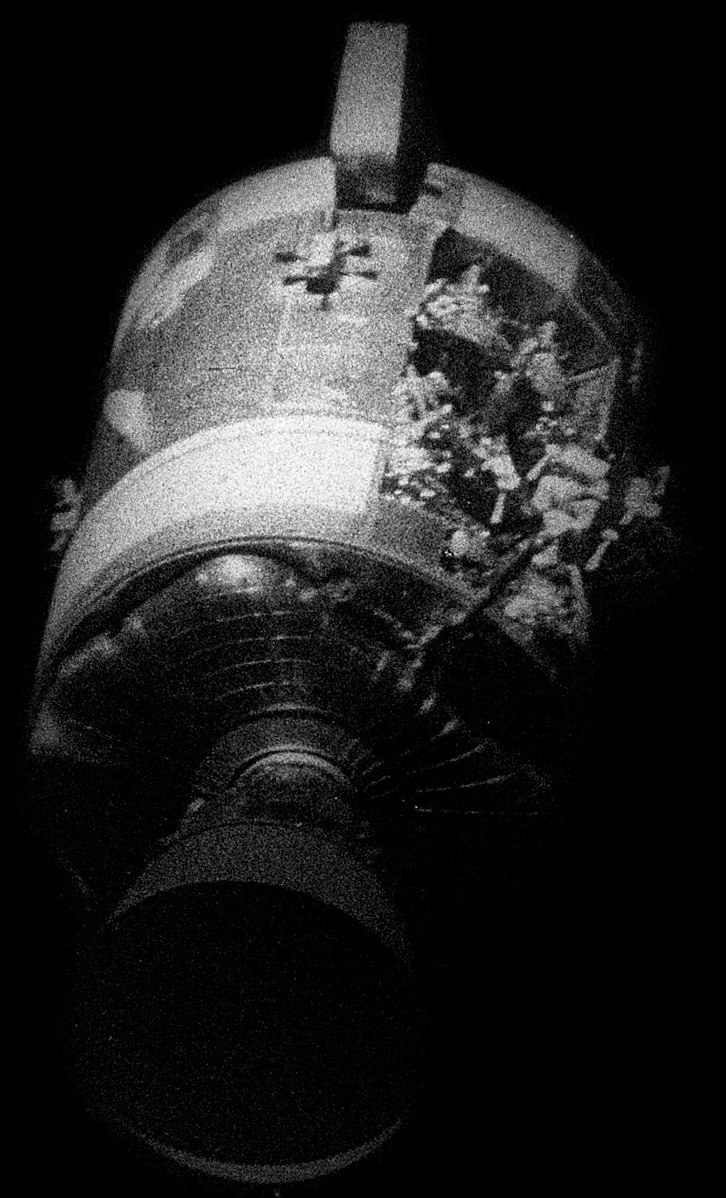
The third Featured Article is a big one: Apollo 13, the 1970 mission to the moon famous for its nearly catastrophic oxygen tank failure just two days in. Many people know it best through the 1995 Ron Howard/Tom Hanks film, but more than 2 million people a year go to Wikipedia for information about the real mission. Thanks to Gary’s efforts, in collaboration with another editor, User:Kees08, what people will find is one of the highest quality articles on Wikipedia.
Advancement
Fundraising
On January 31, 2020 we signed an agreement for a new fundraising staff member. After working with Lisa Grossman at Oppenheimer Associates for search services, Paul Carroll joined the staff as the Director, Institutional Funding, effective February 3, 2020. Paul joined Wiki Education on the first day of our All Staff meeting week just after our January Board meeting.
On January 2, 2020, TJ Bliss, as part of his work under contract, submitted the grant report to the Moore Foundation for the Communicating Science grant ($485,000, grant ended 11/5/2019).
Partnerships
This month, we worked with our partners at the Society of Family Planning (SFP) to launch the second iteration of SFP Wiki Scholars courses. SFP is sponsoring additional courses to train their members – primarily medical practitioners – how to add scientific information to family planning articles. Director of Partnerships Jami Mathewson joined two alumni Wiki Scholars in a webinar to announce the initiative to their members and inspire them to apply. After the amazing work SFP Wiki Scholars did in 2019, we’re excited to facilitate these courses with a new cohort of medical professionals and researchers.
In January, we started two additional courses. We’re working with faculty from Keene State College and Plymouth State University as they work on topics related to the United Nations’ Sustainable Development Goals. We’re supporting members of the American Physical Society as they add women physicists to Wikipedia. We’re thrilled to bring so many content experts to Wikipedia and look forward to sharing their impact.
Communications
Curious about what it’s like in our beginning Wikidata course? Digital Collections Associate Lisa Barrier and Digital Collections Manager Kathryn Gronsbell from Carnegie Hall will walk you through it in their guest blog this month, as well as their linked data plans for the future. Jackie Shieh, a Descriptive Data Management Librarian at Smithsonian Libraries, also walks through the course experience in a guest blog. And Jake Kubrin explains a specific project he started developing in our intermediate Wikidata course.
Wiki Scientists sponsored by the National Science Policy Network were also prolific on our blog this month. Daniel Puentes improved articles related to nuclear policy. Dilara Kiran walked us through why she found the course particularly valuable for early career scientists like herself.
New York Academy of Sciences Wiki Scientist Jyoti Patel spoke to the personal reasons behind her commitment to science communication.
One of the Wiki Scholars sponsored at the University of Massachusetts Lowell, Dr. Bridget Marshall, shared what she has learned being part of the course and her plans for teaching Wikipedia writing assignments in the future.
We also republished a great piece by Faith Rovenolt of Vanderbilt University’s Center for Teaching about Dr. Danielle Picard’s Wikipedia writing assignment last fall.
Blog posts:
- A linked data platform with the potential that metadata professionals long for (January 9)
- Improving information about disability healthcare on Wikipedia (January 13)
- Teaching Innovations at Vanderbilt (January 14)
- What students fighting misinformation online looks like
- Wikipedia as a platform for Science Policy (January 16)
- How to share an oral history collection more widely (January 17)
- The value of being a Wiki Scientist (January 21)
- Monthly Report, October 2019 (January 22)
- Monthly Report, November 2019 (January 22)
- On becoming a Wiki Woman Scientist (January 23)
- What to try next: Wikipedia assignment ideas across disciplines (January 23)
- 6 million articles on Wikipedia! (January 27)
- Remembering the unnamed women of history as a Wiki Scholar (January 28)
- How “Join the open data movement: a beginner Wikidata course” changed our view and use of collection data (January 31)
- Why members of the Society of Family Planning are getting involved with Wikipedia (January 31)
Technology
In January, we pushed forward our work on Wiki Education Dashboard student user experience improvements and a better interface for instructors to evaluate student work at each phase of the Wikipedia assignment. The technology team conducted in-person usability tests with several University of Washington students, and made a number of adjustments, bug fixes, and feature improvements to the “My Articles” widget and the training system based on what we learned. Software Developer Wes Reid also worked on a substantial reorganization of the “Students” tab of Dashboard, adding key information about each assigned article and peer review for individual students, which will go live in mid-February.
Finance & Administration
The total expenditures for the month of January were 227K, +$10K than the budget of $217K. The Board was over budget by +$7K due to timing, this $7K will go against the February budget. Fundraising was under ($5K) due to a staffing change ($7K) while adding Outside Contracting support +$2K through transition. General and Administrative are over +$25K due to +21K in Indirect Costs, +$15K in audit fees budgeted in prior months, but were billed in January, +$1K Payroll Costs and under ($12K) in staff meetings that got pushed to February. Programs are under ($17K) due to ($20K) in Indirect Costs, ($8K) in Outside Professional fees and over +$11K in Payroll Cost.
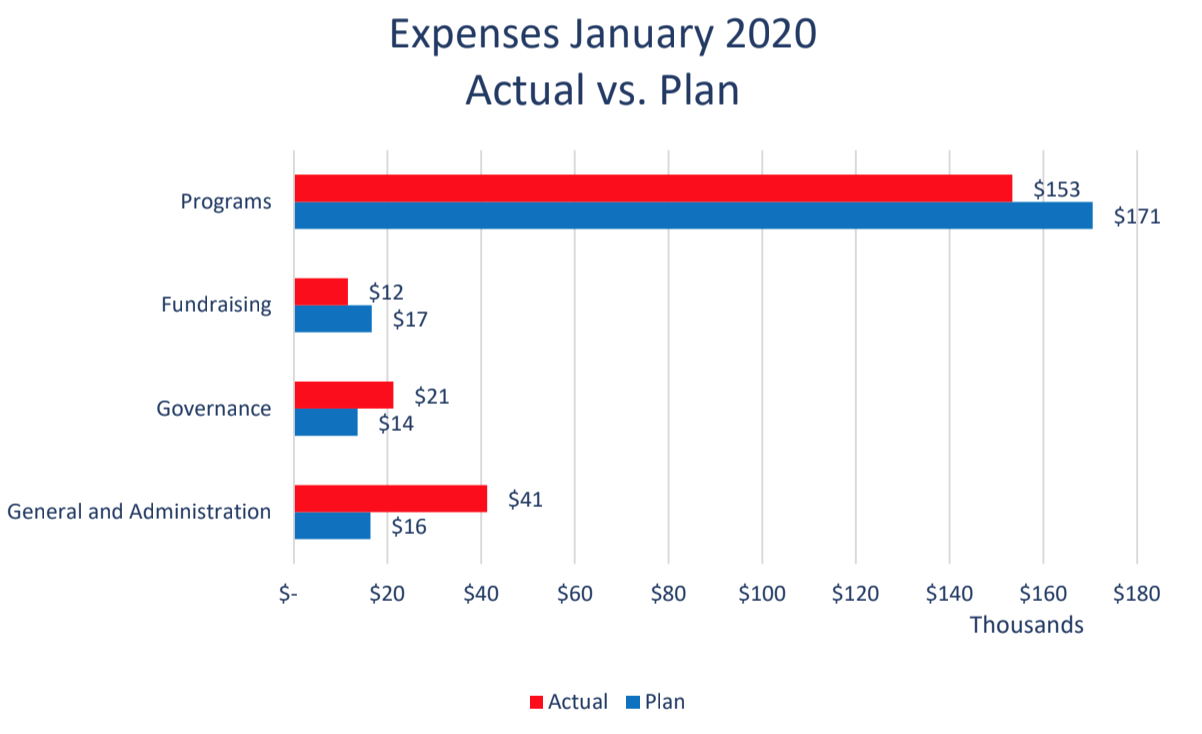
The Year-to-date expenses were $1.330K, ($30K) under the budget of $1.300K. The Board was over +$8K, of which +$7K of January overage due to timing that will even out in February and +$1K in previous Payroll Costs. Fundraising was under ($8K) due to ($3K) in Indirect Costs, ($7K) Staff Change in January, and +$2K in Outside Support. General and Administrative was over +$76K, of which +$99K in Indirect Costs, +$5K Travel, +$2K Payroll Costs, +$3K Communication, while being under ($17K) Staff Meetings and Office Expenses, ($12K) Professional Fees, ($5K) Occupancy Costs. Programs were under ($106K) of which ($95K) in Indirect Costs, ($32K) Travel, ($12K) Communications, ($2K) Office Expenses, with an overage of +$30K Payroll Costs and +$5K in Professional Services.
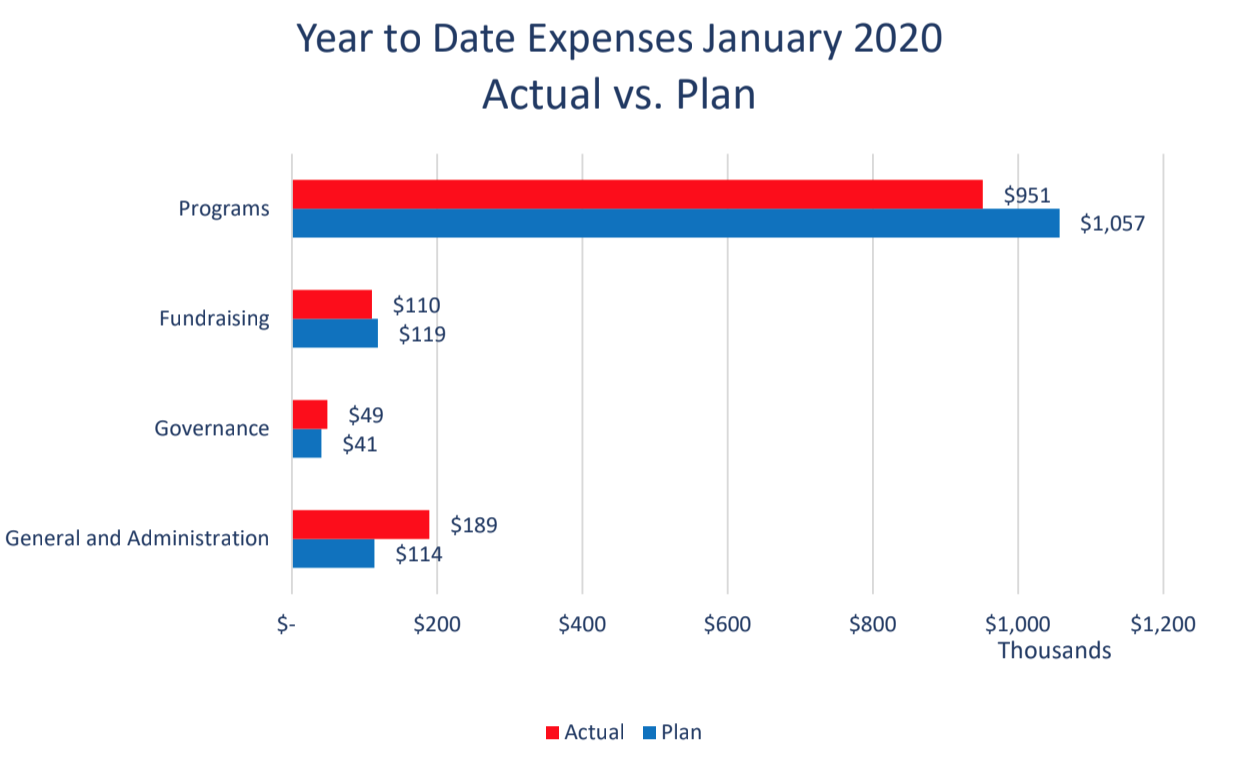
Office of the ED
- Current priorities:
- In-person board meeting
- Hiring of a new fundraiser
- Getting ready for the all-staff meeting in February
In January, board members gathered for their in-person board meeting at the Omni Hotel in San Francisco. The two-day event started with a meeting of Wiki Education’s Finance and Audit Committee which Jordan Daly from SFBay Financials and Susan Malone from Hood & Strong joined in person. Then, Frank provided the board with a report on the current status of the organization, followed by an outlook on the fundraising situation and a discussion. Afterwards, LiAnna Davis gave the board an update on Wiki Education’s programmatic activities. On the second day, Sage Ross provided an update on the recent work of the technology department. Then, Frank and LiAnna presented different options for what to focus on in next fiscal year and discussed these options with the board. Subsequently, board members Carwil Bjork-James and Bob Cummings gave a presentation titled “Five Major Trends in Higher Ed/OER and How they May Impact Wiki Education.” At the end of the meeting, the board approved the creation of an Advisory Board, the extension of our current strategic plan, and two new board members: Jon Cawthorne, Dean of the Wayne State University Library System and incoming president of the Association of College & Research Libraries (ACRL), and Meaghan Duff, Owner & Principal of Mercy Education Partners and former Senior Vice President for Partnerships & Strategy at Faculty Guild.
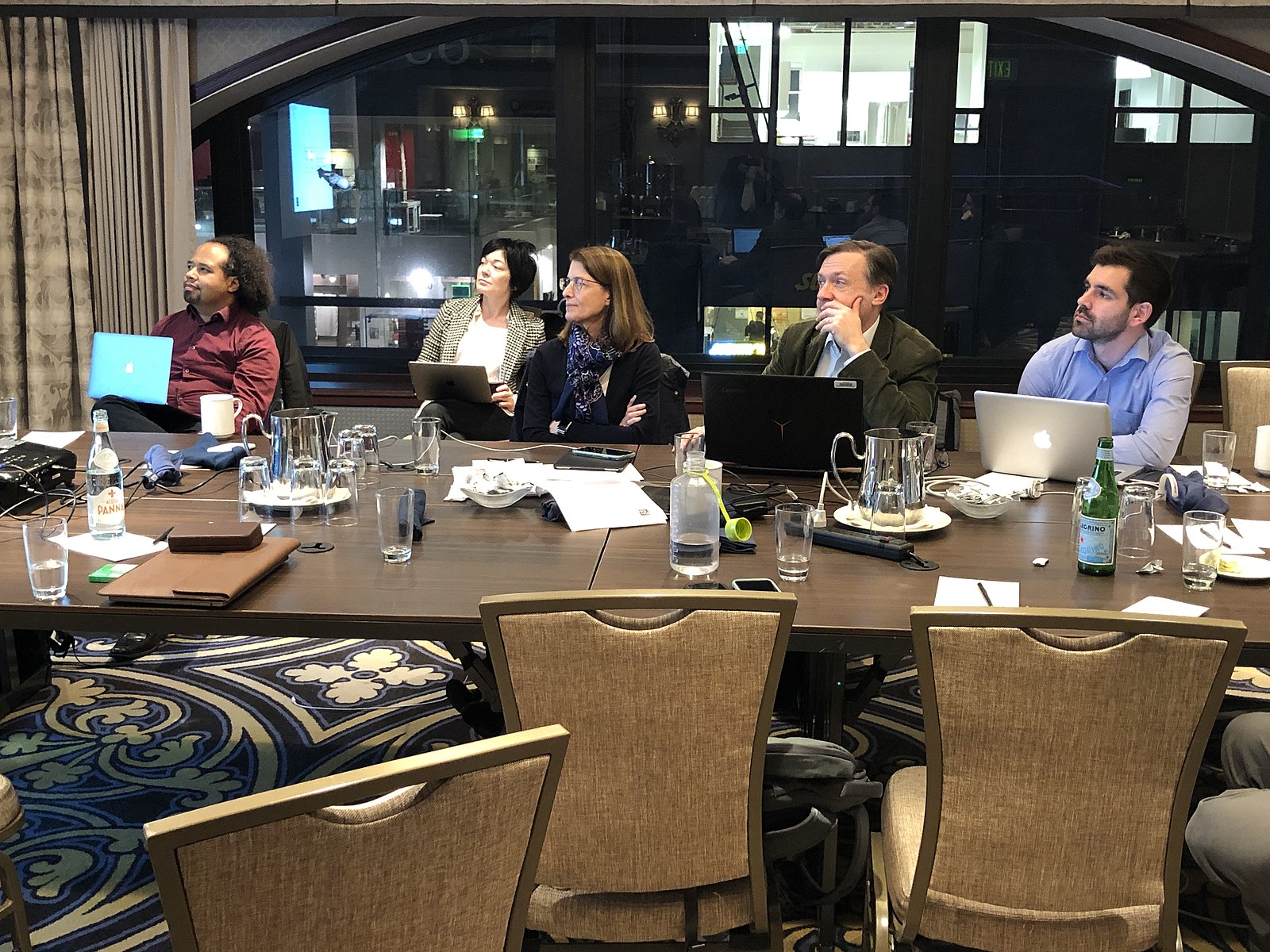
Left to right: Carwil Bjork-James, Sue Gardner, Karen Twitchell, Bob Cummings, PJ Tabit.
Also in January, Frank finalized his search for a new fundraiser. With the help of Lisa Grossman from recruiting firm m/Oppenheim, he hired Paul Carroll as Director, Institutional Funding. Prior to joining Wiki Education, Paul worked as a grantmaker with the Ploughshares Fund, a public foundation that addresses international security. Paul served as the program director with responsibilities for a roughly $6 million annual grantmaking budget. He has also served on the steering committee of the Peace and Security Funders Group (PSFG), an international network of foundations and individual donors interested in a broad range of peace, human security, and development issues. Paul has lived on both sides of the fundraising/grantmaking table – experience that adds to his understanding of and appreciation for the craft of development, communications, and partnership-building.
